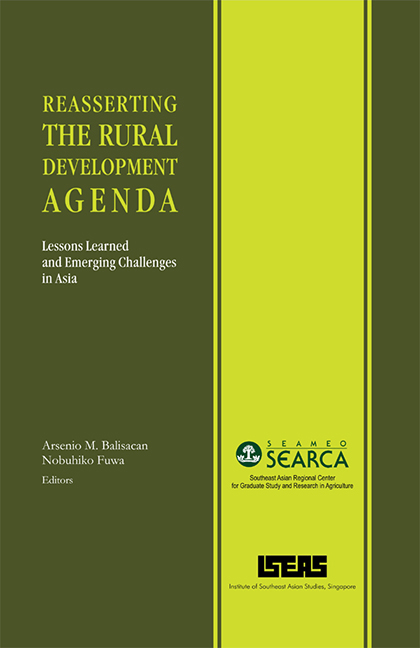Book contents
- Frontmatter
- Contents
- Tables
- Figures
- Preface
- Contributors
- 1 Challenges and Policy Options for Agricultural Development – Overview and Synthesis
- 2 The Economics of Agricultural Development: What Have We Learned?
- 3 The Role of Social Structures and Norms in Agricultural Development: Africa and East Asian Communities Compared
- 4 Food Security in a Globalised Setting
- 5 Poverty and Vulnerability
- 6 Asian Agricultural Development: From the Green Revolution to the Gene Revolution
- 7 Dryland Agriculture in Asia: Ideas, Paradigms, and Policies
- 8 Establishing Efficient Use of Water Resources in Asia
- 9 Improving the Delivery of Extension Services to Rural People: New Perspectives
- 10 Land Tenure and Forest Resource Management in Asia
- 11 Globalisation and the Poverty-Environment Link in Asian Agriculture
- 12 The Supermarket Revolution with Asian Characteristics
- Index
11 - Globalisation and the Poverty-Environment Link in Asian Agriculture
Published online by Cambridge University Press: 21 October 2015
- Frontmatter
- Contents
- Tables
- Figures
- Preface
- Contributors
- 1 Challenges and Policy Options for Agricultural Development – Overview and Synthesis
- 2 The Economics of Agricultural Development: What Have We Learned?
- 3 The Role of Social Structures and Norms in Agricultural Development: Africa and East Asian Communities Compared
- 4 Food Security in a Globalised Setting
- 5 Poverty and Vulnerability
- 6 Asian Agricultural Development: From the Green Revolution to the Gene Revolution
- 7 Dryland Agriculture in Asia: Ideas, Paradigms, and Policies
- 8 Establishing Efficient Use of Water Resources in Asia
- 9 Improving the Delivery of Extension Services to Rural People: New Perspectives
- 10 Land Tenure and Forest Resource Management in Asia
- 11 Globalisation and the Poverty-Environment Link in Asian Agriculture
- 12 The Supermarket Revolution with Asian Characteristics
- Index
Summary
Introduction
The subject of this chapter's title is potentially vast. In developing Asia as elsewhere, the connections between globalisation (used here to mean the process of increasing integration with the global economy), poverty and environment are complex, multidirectional, and idiosyncratic. With such a broad topic there can be no consensus on methodologies with which to understand and analyse them, and nothing approaching a universal view of normative or policy implications. To avoid simply serving up a heavily qualified list of generalisations, the scope of this chapter is thus restricted to a subset of issues that are arguably of relatively greater importance in developing Southeast Asia. The environmental focus will be on interactions between agricultural or aquacultural development and the natural resource base, excluding, more specifically, urban problems of air and water pollution and solid waste disposal, and global issues such as climate change.
Over time, the conversion of natural resources for use in agriculture and fisheries production has generated income growth, but at the same time has imposed significant costs on developing Asian economies in the form of diminished watershed and coastal ecosystem function, land degradation, biodiversity loss, and loss of amenities associated with the natural landscape (e.g., ADB 2000). In developing economies, many issues revolve around changing incentives to exploit natural resources, a process which typically induces the movement of labour toward, or away from, natural resource stocks. This occurs in the context of overall population growth, itself an important element in the poverty-environment nexus. The discussion in this chapter will address mainly the causes and consequences of population movements in relation to the resource base, and much less on the consequences (let alone the causes) of aggregate population growth and its relation to poverty and the demand for natural resources.
That economic growth leads to poverty alleviation is one of the most robust stylised facts of economic development. When exhaustible and depletable environmental and natural resource assets are treated as “factors of production” (Lopéz 1994), their exploitation contributes to economic growth and thus to poverty alleviation. This process, however, is understood to have costs as well as benefits. Computations of these costs in the aggregate — so-called “green accounting” exercises — vary widely.
- Type
- Chapter
- Information
- Reasserting the Rural Development AgendaLessons Learned and Emerging Challenges in Asia, pp. 335 - 368Publisher: ISEAS–Yusof Ishak InstitutePrint publication year: 2007



